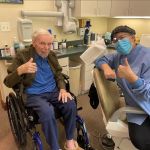Why Good Dental Care is Crucial for Elderly Patients: Protecting Their Health
As someone who has always been mindful of dental health, I began to realize just how important good dental care becomes as we age. When my grandmother started having trouble with her teeth, I saw firsthand how aging affects oral health. I’ve since learned that oral hygiene is often overlooked when it comes to elderly patients, but it's just as critical as it is at any other stage of life. Good dental care not only helps maintain the ability to eat and speak comfortably, but it also plays a vital role in overall health. In this article, I’ll share my insights into the importance of good dental care for elderly patients and why it’s something that should never be neglected.
1. The Link Between Oral Health and Overall Health
One of the first things that became clear to me when caring for my elderly relatives is the direct link between oral health and overall health. The mouth is the gateway to the body, and poor oral hygiene can contribute to serious health issues like heart disease, diabetes, and even dementia. I was surprised to learn that untreated gum disease, for example, can increase the risk of heart disease. It’s a reminder that dental care isn’t just about keeping teeth clean but about safeguarding our overall well-being.
1.1. Gum Disease and Systemic Health
Gum disease, or periodontitis, is common among older adults and can have far-reaching effects on the body. I noticed this when my grandfather developed severe gum disease, and his doctors warned us that it could exacerbate his existing heart condition. Studies show that the bacteria from infected gums can enter the bloodstream, affecting the heart and increasing the risk of stroke and heart attack. By maintaining good dental care habits, elderly patients can reduce the risk of these serious complications.
1.2. The Risk of Tooth Loss and Malnutrition
Another concern I came across in my family’s experience was tooth loss, which can severely impact an elderly person’s ability to chew food properly. This can lead to difficulties with eating, making it harder to maintain a balanced diet. I saw how my aunt struggled to chew certain foods after losing several teeth, which led her to avoid healthy, fibrous foods like vegetables. Over time, this lack of nutrition can contribute to malnutrition and further complications. Maintaining good oral hygiene and seeking dental care when needed can help prevent tooth loss and ensure that elderly patients can enjoy a wide range of nutritious foods.
2. Challenges in Dental Care for the Elderly
Caring for the oral health of elderly patients comes with unique challenges. Aging can bring about various physical and cognitive changes that make maintaining oral hygiene more difficult. For example, arthritis in the hands can make it harder for elderly individuals to brush their teeth effectively. Additionally, cognitive impairments like dementia can make it difficult for patients to remember or understand the importance of regular brushing and flossing.
2.1. Limited Dexterity
One challenge I encountered when assisting my elderly relatives with their dental care was limited dexterity. Many elderly people, including my grandfather, develop arthritis in their hands, making it difficult to grip a toothbrush and perform the necessary motions for brushing. I found that switching to an electric toothbrush helped significantly, as it required less effort to clean the teeth effectively. Electric toothbrushes are a great option because they are easier to use and ensure that the teeth are cleaned properly, even for those with limited hand strength.
2.2. Cognitive Impairment
Another common issue is cognitive decline, particularly in elderly patients with dementia or Alzheimer’s disease. My mother faced this challenge when taking care of my grandmother, who often forgot to brush her teeth. This led to a buildup of plaque and a higher risk of gum disease. In these cases, it can be helpful to set a routine, use reminders, or even ask for assistance from caregivers. I found that using mouthwashes or fluoride rinses as a supplement to regular brushing can help protect against cavities and gum disease, especially if a patient is unable to brush regularly on their own.
3. Preventive Measures and Regular Dental Visits
Preventive care is the cornerstone of maintaining good dental health as we age. I learned that regular dental checkups are crucial for elderly patients to catch issues early before they escalate into serious problems. These visits allow dentists to clean the teeth thoroughly, check for signs of oral diseases, and provide advice on maintaining good oral hygiene. During one of my grandmother’s dental visits, the dentist detected early-stage gum disease and was able to provide treatment before it worsened. This experience showed me just how important it is to keep up with regular dental visits, even if there are no noticeable problems.
3.1. Regular Checkups
I recommend that elderly patients visit their dentist at least twice a year for a professional cleaning and checkup. These visits provide an opportunity for early detection of conditions like gum disease, cavities, or oral cancer. I’ve found that regular dental visits can help elderly patients maintain a healthier mouth, as dentists can address issues before they cause pain or discomfort. For those with chronic conditions like diabetes, regular checkups are even more important because of the higher risk of oral infections.
3.2. Fluoride Treatments
Fluoride is another preventive measure that can be especially beneficial for older adults. I discovered that fluoride treatments can help strengthen enamel and prevent cavities, which is particularly important as we age and our teeth become more susceptible to decay. My grandmother, who had trouble with dry mouth due to medication, benefited from fluoride treatments that protected her teeth from cavities and made her feel more confident about her smile.
4. Oral Hygiene Habits for Elderly Patients
Good oral hygiene practices are essential for elderly patients to maintain healthy teeth and gums. I’ve learned that while it can be challenging to stay on top of oral care as we age, it’s absolutely necessary to make it a priority. Here are some important habits I recommend incorporating into your daily routine:
4.1. Brushing and Flossing
The basics of brushing and flossing are just as important for elderly patients as they are for younger ones. I make sure to remind my family members to brush their teeth at least twice a day and floss regularly. For elderly patients with dentures, it’s just as crucial to clean the dentures thoroughly every day to prevent plaque buildup and oral infections. Using a soft-bristled toothbrush and fluoride toothpaste is especially important for those with sensitive gums or receding gums.
4.2. Staying Hydrated and Using Mouthwash
Dry mouth is another common issue that elderly patients face, especially those on medication. I recommend drinking plenty of water throughout the day to keep the mouth moist and using alcohol-free mouthwash to help with dry mouth symptoms. Mouthwashes that contain fluoride or antimicrobial agents can help reduce plaque and bacteria, improving overall oral health. For my mother, incorporating these small steps into her daily routine has made a big difference in managing her oral health.







 Willamette Dental Group - Puyallup4.0 (117 review)
Willamette Dental Group - Puyallup4.0 (117 review) Midland Park Family Dentistry5.0 (447 review)
Midland Park Family Dentistry5.0 (447 review) BellaSmiles Dentistry4.0 (184 review)
BellaSmiles Dentistry4.0 (184 review) Advanced Dental Designs4.0 (305 review)
Advanced Dental Designs4.0 (305 review) Cash Family Orthodontics4.0 (141 review)
Cash Family Orthodontics4.0 (141 review) Helene M. Dolce, DDS4.0 (136 review)
Helene M. Dolce, DDS4.0 (136 review) The Importance of Oral Health Education During Pregnancy for a Healthy Pregnancy
The Importance of Oral Health Education During Pregnancy for a Healthy Pregnancy Best Tips for Brushing Your Teeth Properly for Healthy Gums: Essential Techniques for Oral Health
Best Tips for Brushing Your Teeth Properly for Healthy Gums: Essential Techniques for Oral Health Why Skipping Dental Checkups Can Lead to Bigger Oral Health Problems
Why Skipping Dental Checkups Can Lead to Bigger Oral Health Problems Advantages of Porcelain Dental Restorations
Advantages of Porcelain Dental Restorations How Can Diabetes Cause Tooth and Gum Problems? Preventing and Managing Oral Health Issues
How Can Diabetes Cause Tooth and Gum Problems? Preventing and Managing Oral Health Issues Healthy Habits for Promoting Good Oral Health and Hygiene: Tips for a Healthy Smile
Healthy Habits for Promoting Good Oral Health and Hygiene: Tips for a Healthy Smile